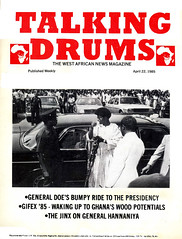Music And Arts Scene
African Records Review
By Kwabena Asamoah
SALIF KEITA/AMBASSADEUR INTERNATIONAL: 'Mandjou' (CELLULOID CEL 6721) 'Mandjou' 'Kandja'/'4V' 'N'Toman'
'Balla' The 'domingo of Malian song' - Salif Keita fronts the famous Ambassadeurs International to play at London's Electric Ballroom on May 9th for the first time but the name of this albino Mandingo singer is already known to London through 'Djougouya' 'Primpin' 'Wale' and many other excellent songs.'Mandjou' is not a recent release but as a classic album Celluloid has re- issued it for the benefit of those who missed it the first time. It is certainly Ambassadeurs' first big hit but others including myself would vote for 'The Best of Ambassadeurs' which is the same as 'Les Ambassadeurs': Dance with Music From West Africa with 'Primpin' and 'Wale'. Whichever way you look at it, Salif Keita and his friends including Ousmane Kouyaté who has also released his debut solo album from Abidjan with the same name are the champions of Mandingo music.
The combination of organ and horns on this album has a class of its own. Kante Manfila, virtuoso of a Mandingo acoustic guitar playing, injects some sweet chords in 'Balla' while the horns and the rhythm guitar blend to make 'N'Toman' the best track on the B-side even though '4V' is widely acclaimed.
The ever-popular 'Mandjou' is not only the best track on side A but also of the entire album on which the group has firmly built its reputation. The relaxed manner in which the singers and the guitarists display their individual talents is certainly a mystery. The solid foundation by Sekou Diabaté's bass and Kaba Kanté's balafon completely liberates the entire music from any shackles especially as the organ and the trumpet take solos in turns. Salif Keita is at his absolute best on the vocal solo. London is anxious to hear more of that.
MORY KANTE: 'A Paris' (SACODISC LS 73) "Gnaga Lemba' 'Wari Massilini'/'Ye Ke Ye Ke' 'M'Balou'
The fusion of kora music and of Western rhythms is becoming a fashion and has even been picked up by producer Bill Laswell (re: Foday Musa Suso's 'Watto Sitta' album) but this concept is nothing new in Africa. Mory Kanté who plays at London's Electric Ballroom, 184 Camden High Street on April 25th has been making successes this blend including 'Courougnegne', an album which made a hit throughout Francophone Africa a few years back.A Guinean (Conakry) by birth who later acquired Malian citizenship, Mory Kanté took up residence in the Ivory Coast from where his fame as an adept kora player spread.
On this album Mory Kante combines Western electronic influences with his traditional instrument more than ever before. Unlike Bill Laswell's production Kanté succeeds in blending the two without giving it an overdose of electronic effect. To please his Ivorian listeners he slips into a nice smootchie 'Wari Massilani' which heavily relies on a Simmons kit. It is on this same A-side that 'Gnaga Lemba' stands out as the best track. With the feel of hi-life the track drives along with the correct urgency and Kanté weaves his kora skilfully behind the guitar and the horns.
The B-side is clearly a Western experimentation, leaning more towards funk. With the help of male and female chorus 'Ye ke Ye Ke' and 'M'Balou' stay clear of too much foreign domination, thanks to Mory Kanté's mathematics. He is determined to charm Europe with his white apparel and music.
ALI BABA: 'Kai Haba' (KAPPA RECORDS SAS 056)- 'Keya Einia' Waioh' 'M'Bororo' 'Django'/'Hadiza' 'Binguel De Bo
Baledjo' Ali Baba pulls his frenzied music from his Cameroonian hat where all others including Sam Fan Thomas and Moni Bile are doing makossa and makassi. Described as goumba soul gandjal, Ali Baba's music is certainly different and intriguing in the context of African music. The album deserves to be heard at least for its good production. Mind you, it took a solid time span of thirteen months from February 1983 to August 1984 to record what looks like Ali Baba's European debut. The line- up of musicians too, is certainly impressive from Many Dibango (soprano solo on 'binguel De Bo Baledjo'), Jules Kamga, Jean-Claude Naimro to Jacob Desvarieus. An expensive project indeed!Apart from 'Django' which is clearly a reggae material the rest of the stuff on this album stay loaylly to the African canvass, varying at appropriate times to suit every dancing mood. 'Hadiza' which opens the B-side employs a funkish approach to encourage the thick chorus to emerge with so much power. The floor will certainly be full if London bears this track at the Electric Ballroom on May 2nd.
'Binguel De Bo Baledjo' is obviously a deliberate plodder which would sway one's head as the track spins off. Monotony is totally absent from Ali Baba's music as listeners will find from all the tracks.
Described as the demon of African music, Ali Baba is reputed to be a hypnotic live performer with his female dancing partners. That probably explains the type of music he plays. It is even more difficult to love.
